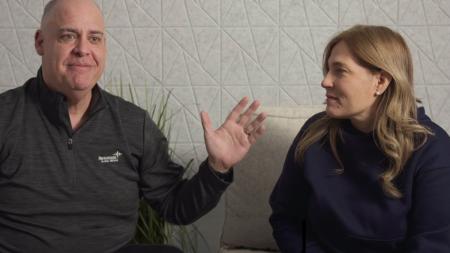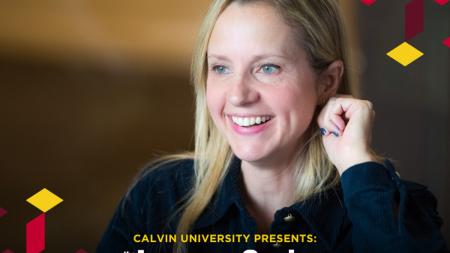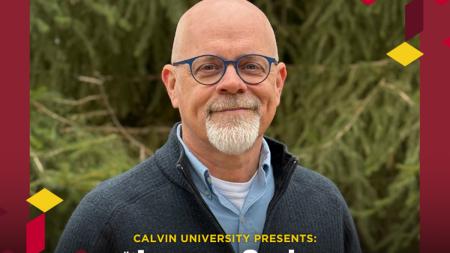Korean Pastors Face the Future

Several years ago Victor Ko was sitting in the Heritage Room at Third Christian Reformed Church in Kalamazoo, Mich., for an interview with church members.
Gold-framed pictures of former ministers – many of Dutch heritage, dressed in suits and ties, and some with severe expressions on their faces – hung on the walls. Ko had been glancing at those photos when, at one point, one of the interviewers leaned over and asked: “You know, we are the Third CRC and with a name like yours and a face like yours, how would you feel being a pastor at our church?”
The question put him on the spot. Ko, who was born in Seoul, South Korea, and had recently graduated from Calvin Theological Seminary, thought it over. Then he said, “I don’t think the challenge is mine. The challenge is that the question you want to ask is, ‘How would you as the Third CRC do with a pastor like me?’”
That was in 1999 and, despite, or maybe because of, the tough question, Ko got the job. And he soon became one of the first Koreans in the history of the denomination to become an ordained pastor at a largely white mainstream CRC congregation.
Given changes in the CRC since that time, said Ko, today he sees that more of his fellow Koreans are finding leadership roles in the denomination – and he is pleased to see that happening.
But as he looks back, he added, neither his face nor his name was really an obstacle for him when he was hired at Third CRC.
“I am a pastor in the CRC because of the call of God,” said Ko, who served Third CRC for eight years before leaving to work as a church planter in Canada. He now serves as the senior pastor at MosiacHouse, a multicultural community of house churches in Edmonton, Alta. “For me, it’s never been about my ethnicity. It is all about how I serve God,” said Ko.
Seeking to Find a Church Home
Ko offered this testimony at a first-ever three-day consultation
with English-speaking Korean CRC ministers from across the United States and Canada in Orlando, Fla., Feb. 24–27.
The goal of the gathering was to mark the growth of Korean pastors – many born in the United States – in finding leadership roles in the church. But the pastors also met to discuss barriers that remain for Korean seminary graduates in receiving calls to congregations that have historically been run and largely filled by people of Dutch ethnicity.
Currently, out of the 1,135 ordained ministers of the Word in the denomination, 215 are ethnic Korean, including 53 who prefer to speak the English language. They serve in a variety of settings.
Victor Ko has served as an inspiration for many of the participants at the consultation. But his story is not the one all Koreans share. For many, the road to finding jobs in the mainstream life of the denomination has been tough. In fact, in searching for a place in the church, an English-speaking Korean pastor or seminarian still faces barriers.
In the following stories we’ll identify some of those struggles. We’ll also see how providence, combined with a pastor’s talents and faith, have helped English-speaking Korean pastors gradually to step into positions that highlight a changing face, and important shift, in leadership in the CRC.
Celebrating a Trailblazer
Both James Lee and Moses Kang are pleased to be serving as Korean pastors in fairly traditional CRC congregations on the East Coast of the U.S.. They credit Rev. Andy Chun for blazing a path for them.
Along with Victor Ko, Chun was one of the first English-speaking Korean pastors to help lead a traditional CRC congregation.
Before he suddenly passed away of a heart attack in 2009, Chun served Covenant CRC in North Haledon, N.J. He was installed there in 2001 after serving three other churches. Chun was active in a variety of church matters and gained respect among many people in the area and the denomination itself, said Lee.
After he passed away, a story in The Banner referred to Chun as “a genial, gifted Korean-born pastor, leading churchman, champion of the poor, and witness for Christ.”
“Andy helped open up the East Coast. He helped to build connections and to give a fair shake for Korean pastors,” said Lee, who came to Christ Community Church in East Islip, N.Y., not long after he graduated from Calvin Seminary in 2018.
“We stand on the shoulders of such men as Victor Ko and Andy Chun. They showed the church that calling ethnically Korean pastors is a good thing” said Kang, who has been pastor of Faith Community Church, a congregation in Wykoff, N.J., since 2024. Before that, he served as the pastor of a CRC congregation in Barrie, Ont.
Without Chun, said Kang, churches on the East Coast may have been reluctant to hire Korean pastors, assuming that their ethnicity wouldn’t be a good fit. “Andy was the first Korean to work as he did in this area. He was so beloved. He helped other churches to see the value of Korean pastors and to have the grace to offer positions and opportunities to us.”
Part of the challenge has been a generational struggle, Korean pastors have said. Decades ago, when the first Korean pastors joined the CRC, they normally served first-generation Korean congregations and, as in the early CRC congregations that spoke Dutch, they spoke Korean. The scope of their ministry was largely focused on new Asian immigrants to North America.
Then came Korean pastors who are often referred to as members of the 1.5 generation. Many in this generation were born in Korea and immigrated with their parents when they were in grade school. There are also second- generation pastors, such as Lee, who are largely English-speaking ethnic Koreans born in North America.
A 1.5-Generation Pastor of Multicultural Leadership
Hyung-Jun Kim, now associate pastor at New Westminster CRC in Burnaby, B.C., is a member of the 1.5 generation. He was born in Korea and lived there until his late teens when his family moved to British Columbia.
After graduating from the University of Toronto, Kim studied theology at Regent College, Leiden University, and Calvin Theological Seminary. And before coming to New Westminster in 2015, he served as a pastor at a Korean Presbyterian Church.
Ten years ago, the church in New Westminster transformed its parsonage into a center for international students from local colleges and hired Kim to work with them. Eventually he became the church’s pastor of multicultural leadership and discipleship, reaching out to the growing Korean population in the neighborhood around the church. In 2020 he was ordained as associate pastor, serving under his long-time mentor, Andrew Beunk, the senior pastor.
“I’m not just the pastor of our many Korean members but of the entire church,” said Kim. “My sense is that having a Korean pastor serve a CRC congregation [that isn’t ethnically Korean] is not as common as it should be. But you can finally see that it is happening in some places.”
Korean pastors, he added, “can be a blessing. They are capable and hardworking, and there is a tendency among the younger ones to want to serve a larger, English-speaking church.”
Watching the Trend Line
In some cases it has been an upward and sometimes fruitless climb, however, for Korean pastors to find positions in traditional CRC congregations.
When he graduated from Calvin Theological Seminary in 2015, Daniel Jung wanted to stay in Grand Rapids, Mich., with his family because he loved the city. He applied at churches in and around West Michigan. It turned out, though, that he spent two years sending out dozens of applications and resumes to little avail.
“Once it became clear in phone interviews that I was Korean, I could feel the tension,” said Jung, who grew up in Santa Clara, Calif. “I had only two face-to-face interviews over two years, and eventually I realized that it wasn’t meant to be.”
On one occasion, he added, one of the church leaders he talked with, upon learning he was Korean, suggested he apply for a position at a nearby Laotian congregation.
“At that time the infrastructure just wasn’t in place to support Korean pastors in the traditional churches, especially in West Michigan,” he said. “I just didn’t know what to do. I kept feeling a low-grade sense of being an outsider.”
Jung finally was hired by the Stockton Bansuk Presbyterian Church in California, a congregation with a large ethnic-Korean background. And today he is serving at Home of Christ, an Asian-American Presbyterian Church in America congregation in Cupertino, Calif.
Jul Medenblik, president of Calvin Seminary, said the number of Korean students has grown over the years until today about one in six of the seminary’s more than 300 students is Korean.
“Right now I see the trend line of Korean students exploring ministry in the CRC,” Medenblik said. And “as churches are opening to other cultures, they are starting to see that Korean pastors are capable and fit.”
A Heartfelt Apology
Reluctance among established churches to hire Korean pastors has only been part of the struggle, however. Rev. Moon Bae Kim notes that there has also been a generational challenge.
Born in South Korea, Rev. Moon Bae Kim is a first-generation Korean pastor who attended the consultation of Korean pastors in Orlando. And at the consultation he offered an apology.
In an interview for this story, Kim said that many first-generation ministers were steeped in a patriarchal tradition and failed to make way and thoroughly support the next generation of Korean pastors who came after them.
“As first-generation pastors, we tended to look down on and treat younger pastors as children,” said Kim, who has been the pastor of Korean Grace CRC in Grand Rapids for many years. “We had a very authoritative attitude. We haven’t shown the younger pastors the proper respect.”
His words were welcomed at the consultation as a sign of change, offering a sense that it is time – perhaps long past time – to get behind younger Korean pastors and help them find positions in the broader church, said James Lee, who helped to lead the consultation in Orlando.
Part of the work Kim does is to mentor Korean students at Calvin University and to stick close to those who decided to continue on to Calvin Theological Seminary, he said. “I think first-generation pastors should work with and recommend young Korean pastors to the churches and their parishioners,” he added.
Kyo Chan Koo, a student at Calvin Seminary, has worked with Kim, who, he said, helped him to navigate through college and now the seminary in the midst of a culture that he is still learning and finding ways to embrace. Koo grew up in South Korea and Singapore.
Now a pastoral intern at Living Water CRC in Grand Rapids, Koo credits Kim with standing beside and teaching him the basics of being a pastor: “Pastor Kim’s attention to detail regarding ministry starts from understanding the necessary history that surrounds a given situation or person. But he always says that having strong theological and scriptural knowledge is the bare minimum.”
Once he learned the basic theology, said Koo, he learned from Kim “that what really allows pastors to go above and beyond is the ability to work with people. You need to be empathetic, and having an empathetic heart is at the core of being a leader who loves his people, just as Jesus loves us.”
Becoming the Pastor of Ideal Park CRC
Jake Jeong’s story illustrates in important ways the twists, turns, ruts, and uphill slogs – as well as the joys and satisfactions – a Korean candidate may face on the way to becoming the leader of a CRC congregation.
Today, in a quiet, low-key fashion, Jeong has become one of the first Koreans to pastor a mainstream church with Dutch roots and history in the Grand Rapids area.
Earlier this year, he was installed as the pastor of Ideal Park CRC, a small congregation in suburban Wyoming.
Born in Korea, Jeong came to the U.S. about seven years ago to attend Calvin Theological Seminary. He decided to come here on the recommendation of a college professor who was himself a Calvin Seminary graduate.
But studying at Calvin Seminary had its hardships, said Jeong.
“As a Korean student, it was hard to find a place to mingle into the established Dutch society,” he said. “Genuine support existed, but it was few and far between.”
After graduation, Jeong said, he had no clear idea where to turn. He wanted to pastor and preach at a church – but he couldn’t find a spot and instead took a position as a chaplain intern. He eventually left that job and spent a while trying to find a way into a church position.
Finally, he said, “my gracious God opened the door for me to Graafschap Christian Reformed Church [near Holland, Mich.], where I became employed as their worship director in the music and media ministry.”
Graafschap CRC is one of the first churches in the denomination, having broken from the Reformed Church in
America in 1857. At this historic church, said Jeong, “God prepared me holistically – language, relationship, culture, ministry, etc. – in the CRC context and also redeemed my calling fully through wonderful experiences in the congregational ministry setting.”
Even though he enjoyed the ministry in Graafschap, said Jeong, he yearned to serve as the pastor of a church and began to look for a pastoral position. Wanting to stay in the Grand Rapids area with his family, he hoped to find a church close to home.
“I went through the CRC computer portal to search for positions,” he said. “I ended up applying to a couple of churches in the area, and Ideal Park was the church that finally wanted to offer the position.”
For him, it has been a long journey mixed with disappointments and yet hope. “Overwhelmed by the grace of God, I accepted the call to Ideal Park Church,” he said.
Finally an ordained CRC pastor, Jeong said, he has gotten to know the people at Ideal Park and is especially grateful to be able to preach the Word.
Being a first of a kind – a young, English-speaking, Korean pastor of a traditional West Michigan church – isn’t particularly important to him, though.
What is important to Jeong, he said, is the very thing that Victor Ko mentioned in accepting his first position at Third CRC.
“It is the call of God,” said Jeong. “That’s what I have been searching for and that I am following.”


